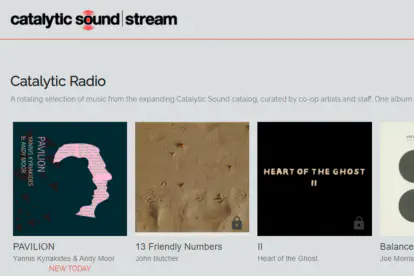A New Streaming Model Built by Avant-Garde Improvisers

Andy Crush on Pitchfork recently wrote about Catalytic Sound (Meet the Experimental Musicians Who Built Their Own Streaming Service), a collaborative platform in which experimental musicians built their own streaming service out of dissatisfaction with the status quo in digital audio streaming and the music industry, more in general.
Catalytic Sound, a cooperative organization comprising 30 avant-garde instrumentalists and composers, is attempting to actualize this dream — and hoping to help other similarly minded musicians do the same for themselves. In January, the co-op’s partners launched Catalytic Soundstream, a small-scale streaming platform that charges listeners $10 per month for access to a rotating library of albums from the fringes of improvised music.
Writing as a member of Reprex, a startup that brings together the sensibilities of musicians, data scientists, ethnomusicologists, and policy scholars, I find this important initiative — in an arts and entertainment context increasingly dominated by a few large companies — inspiring, if not plain heartwarming. Here are but a few of the many reasons:
– The impulse behind Catalytic Sound reveals something at the interface between practical and poignant about current times. The ever-growing platform economy — in which platforms are not only facilitating interactions and transactions between producers and consumers, but also becoming producers in their own right (think Netflix and Amazon making their own films and series, Spotify circumventing record labels and signing its own artists and creating its own genres) — is cornering global markets. From the point of view of listeners or viewers, options are constrained according to which platform: you can access only what you have subscribed for, and within that selection, certain recommendations are pushed to the detriment of others. Moreover, the options you are exposed to increasingly converge around the ideals of the platform owner. From the point of view of artists and media producers, being findable on certain platforms becomes essential, and this often means conforming to platform-imposed agendas and aesthetics, as Liz Pelly astutely explores.
– The story behind Catalytic Sound reminds us that there are alternatives. Our Listen Local project shares a similar ethos: we believe that there must be better options and we take action because we realize that these alternatives will not materialize unless ideas and forms of collaboration come from new places and unconventional pools of talent. Reprex was born out of dreams similar to those expressed in Cush’s article: “What if we got together and built an alternative platform that prioritized the needs of independent musicians? What if we made the rules about who gets paid, and how?”
– Catalytic Sound underlines the importance of openness: As Andy Cush narrates, the Catalytic Sound project started with tweets by Nipsey Hussle, in which the the late Los Angeles rapper shared how much money one million streams translated to in different streaming platforms (around $12,500 in Tidal and $4,000 in Spotify and Amazon Music). Having a sense of these numbers led to some serious coming to terms with how little musicians make through streaming, and the need to look for an alternative, no matter how modest. It’s a matter of principle: “Catalytic isn’t making any of its partners rich, but then again, neither is Spotify. (Even the $46 the musicians received at minimum last month adds up to a bigger yearly check than plenty of artists see from corporate streaming.)” At Reprex, we prioritize open data and open source collaboration as a way to build bridges between businesses, policy-makers, and academia.
Ultimately, the model Catalytic Sound is proposing is one about collaboration in which similar grassroots organizations share knowledge and work towards common goals. So far, in our Listen Local initiative, we have focused on the ways in which independent and marginalized artists can find their way on existing streaming platforms, and how listeners find locally relevant artists instead of being taken to the playlists of international superstars. Catalytic Sounds opens a new perspective— starting a new streaming service as a way of participating in that larger historical project of dismantling, rethinking, and creating, recalling what a certain Audre Lorde had to say about undoing the master’s house pdf.
If you read, and especially if you write on Medium, you can read and contribute to Data & Lyrics on the premium bloggging platform, too.